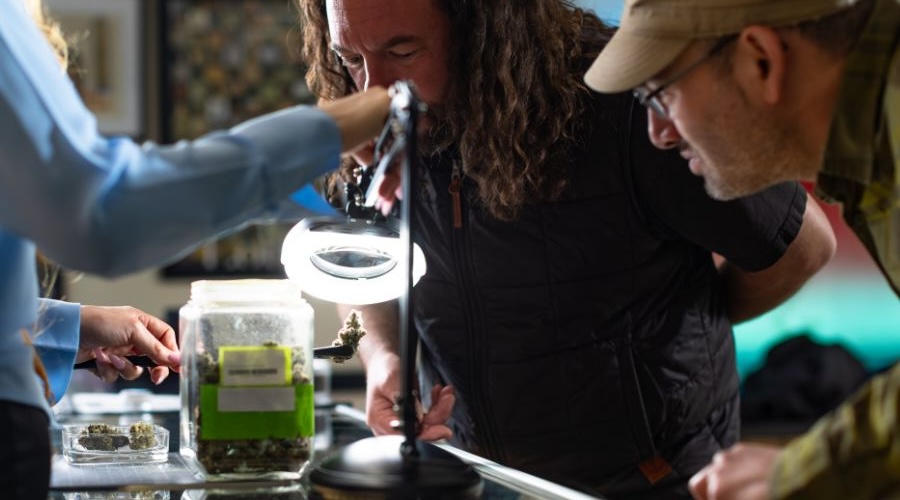STORE INFO
Location & Store Hoursmy cart
Secure checkout
Cannabis laws vary widely across the U.S., but are sometimes described in similar terms. Some states allow full adult-use sales. Others have medical-only systems, partial reforms, or none at all.
The difference is in terms that are often used interchangeably, but the meaning is not the same.
So what exactly is the difference between decriminalization and legalization?
Decriminalization means something is still technically illegal, but the penalties for it are less severe. You don’t get charged with a crime, but you might get a citation, a fine, or have the product confiscated.
When it comes to cannabis, this means that you’re not allowed to sell it, grow it, or buy it, but getting caught with a small amount won’t automatically lead to arrest or jail time.
While it doesn’t establish a legal market, decriminalization can reduce the personal and social impact of cannabis-related charges. In many states, it has helped ease pressure on the court system and reduce long-term consequences tied to minor possession, like losing a job or student aid.
Legalization means cannabis can be produced, sold, and purchased under a set of defined laws. This includes licensed dispensaries, product testing, tax collection, and rules for everything from packaging to advertising.
In most states that have legalized cannabis, adults over a certain age (usually 21) can purchase regulated products from authorized stores. Some states also allow home cultivation, with limits on how many plants you can grow.
Legalization reduces the need for informal or underground markets by making products legally available through licensed sellers. It also introduces quality control: lab testing, labeling standards, and dosage regulation help consumers understand what they’re buying.
For states, legalization can bring new revenue through cannabis taxes and licensing fees. For you, it can mean access without the legal uncertainty.
The main difference between decriminalization and legalization is that one leaves supply unregulated, while the other establishes how cannabis enters the legal system, from production to retail.
In decriminalized states, enforcement may be lighter, but day-to-day access is a problem. Cannabis isn’t openly sold, but it's still used, and without a legal system in place, people rely on unregulated sources.
Legalized states offer more of a structure. Licensed stores, tested products, and clear limits reduce ambiguity. You know where you can go, what you can buy, and how much is allowed.
That structure often applies to hemp-derived cannabinoids, too. In legalized states, cannabinoids like CBD and CBG may be available in dispensaries and they’re more likely to follow labeling, testing, and packaging requirements. Even though these compounds are federally legal when derived from hemp, they can sometimes get caught up in changes.
Texas illustrated this recently. A 2024 bill proposed banning consumable hemp products that contain any THC, something that would have affected many CBD items. The bill was vetoed, but it showed how quickly rules can change.
Recognizing the difference between decriminalization and legalization in practice makes it easier to understand how these laws affect access, clarity, and use.
In a legalized state, you can usually walk into a store, compare brands, check test results, and leave with a receipt. Products are often clearly labeled, showing THC levels, ingredients, and whether they contain cannabinoids like CBD. There are age restrictions and packaging rules, but there’s a system in place to guide both businesses and buyers.

In a decriminalized state, you might be able to carry a certain amount without much risk, but there’s no legal way to buy it. That often pushes people toward unregulated sellers or gray-market products.
The difference between decriminalization and legalization is most obvious when it comes to quality. In legal markets you know exactly what you’re getting, while in decriminalized areas product sources are unknown and consistency is not certain.
So while both models might eliminate criminal penalties, they offer different experiences when it comes to shopping and access.
Carrying cannabis across state lines is illegal under federal law, even if both states have legalized it. Hemp-derived cannabinoids like CBD are treated differently at the federal level, but state laws still vary.
Here's what to keep in mind before traveling with any cannabis-related product.
Some states allow full-spectrum products, others permit only THC-free versions. Look up possession limits, THC thresholds for hemp products and product restrictions (some states don’t allow smokables, infused foods etc.).
If carrying CBD or CBG, keep the original packaging and a Certificate of Analysis (COA). This shows THC content is within the federal limit (less than or equal to 0.3%) and helps if questions come up during travel.
TSA permits hemp-derived CBD, but enforcement can vary. Carry sealed, clearly labeled products. Avoid raw flowers, and check airline policies for vapes or infused items.
Carrying large amounts of any cannabis product, even legal ones, can lead to more scrutiny or different enforcement rules depending on the state.
So, is decriminalization the same as legalization?
No, even though they are often discussed together, they reflect different legal approaches. The difference between decriminalization and legalization shapes what you can carry, where you can buy, and how safe your product really is.
Knowing how your state defines these terms can help you understand what’s allowed and what isn’t. This applies to THC products but also to how CBD and other cannabis-derived compounds are handled at the state level.
Make sure to keep informed so you can always navigate all compliance with confidence.